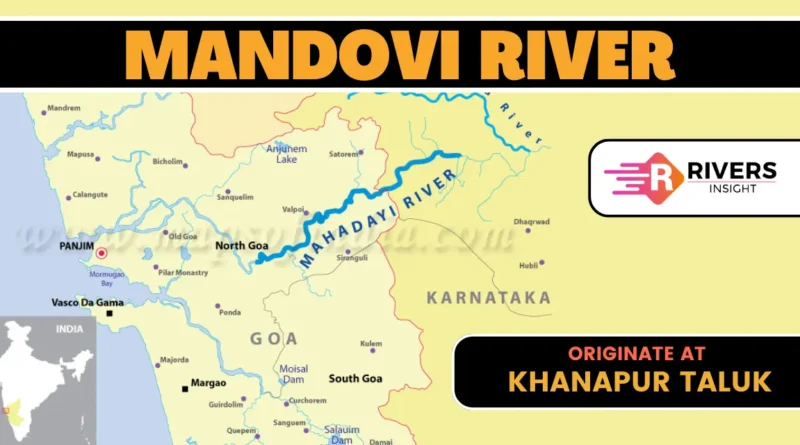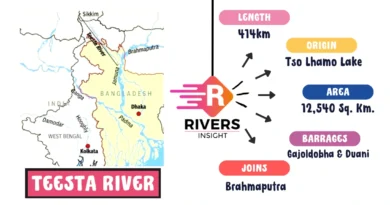Mahadayi or Mandovi River of Goa with Map
The Mandovi River, also called Mahadayi or Mhadei, originates from the Bhimgad Forest in the Western Ghats, located in the Belagavi district of Karnataka. With a total length of approximately 81 kilometers, the river’s source is roughly 900 meters above sea level. In this article, we will explore the details of the Mandovi River, including its course, tributaries, and other geographical features.
Table of Contents
Geographical Features of Mandovi River
The Mandovi River is the largest and most important river in Goa. It is also known by its previous name, Goamati, from which the name of the state of Goa is believed to have originated. Further, in Karnataka and Sattari taluka of Goa, the river is known as ‘Mahadayi‘, which means ‘The great mother‘. This name is given to the river because it nourishes the culture and ecosystem of Sattari taluka in Goa.
Origin and Course of Mandovi River
The Mandovi River originates in Bhimgad, Karnataka’s Belagavi district, in the Western Ghats. From here, the river flows northwest for 35 km through the Western Ghats in Karnataka, passing through the towns of Khanapur and Supa before entering Goa.
Once in Goa, the river flows west for 40 km through the Sattari Taluka, passing through the towns of Valpoi and Sanquelim before reaching the Cumbarjua Canal. The Cumbarjua Canal connects the Mandovi River to the Zuari River, allowing iron ore ships to access the interior regions. The river then flows southwest for 30 km through the Cumbarjua Canal, passing through the Divar, Choro, and Vanxim islands before emptying into the Arabian Sea at Mormugao harbor.
Tributaries of Mandovi River
The Mandovi River has several tributaries, including:
- Sarang
- Lohi
- Nanoda
- Khandepar
- Nerul River
- Valvanti River
- Udnai River
- Dudhsagar River
- Ragada River
- Kotrachi Nadi
Islands
Here is a list of the three major freshwater islands in the Mandovi River:
- Divar
- Choro
- Vanxim
Kalasa-Banduri Project Dispute
The Kalasa-Banduri project is a plan to build a dam on the Kalasa and Banduri tributaries of the Mahadayi River, to transfer water to the Malaprabha, a tributary of the Krishna River.
Key Facts:
- The project was first planned in 1989
- The Karnataka government claims that the project will help boost drinking water supplies in the Belagavi, Dharwad, and Gadag districts
- Goa has objected to the project, citing concerns about the impact on its fragile ecosystem and the need to preserve the Mahadayi River as a source of sweet water
Goa’s Concerns:
Goa is worried that the project will harm ecosystem and lead to saltwater intrusion into the Mahadayi River, which would decimate its mangroves. The Mahadayi River is crucial for Goa’s fishing industry and provides drinking water to the state’s population. Any diversion of the river’s water would have a significant impact on the state’s water supply.
The Dispute So Far:
- The Mahadayi Water Disputes Tribunal was established in 2010 to resolve the issue, with representatives from Goa, Karnataka, and Maharashtra
- In 2018, the tribunal allowed Karnataka to divert 13.45 TMC of water to the Malaprabha dam, which was less than the original plan of 7.56 TMC
- In 2019, the Ministry of Environment and Forestry stated that the project did not require environmental approval since it aimed to meet drinking water demands
- In 2020, the Supreme Court gave the Karnataka government temporary relief, allowing it to carry out the tribunal’s final order, which was challenged by Goa and Maharashtra.
The Supreme Court’s final order is still pending, with the bench chaired by Justice D.Y. Chandrachud stating that it would issue a final order after hearing the petitions submitted by all three states that have objected to the tribunal’s order. The construction of the project could benefit the state’s disaster-prone northern districts.




